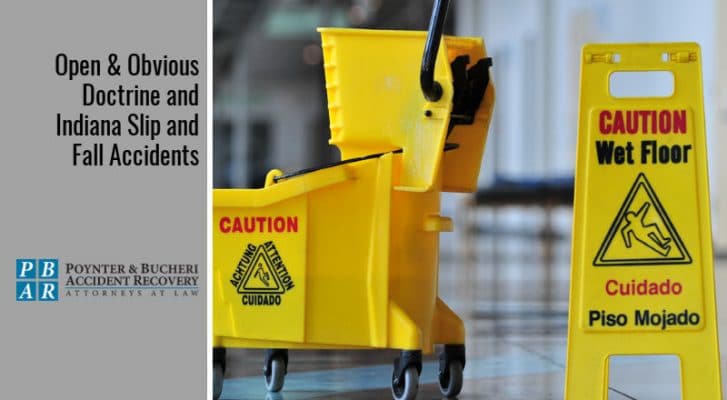
Open & Obvious Doctrine and Indiana Slip and Fall Accidents

What you’ll learn reading this article:
- It’s important for everyone, whether you are a landowner, a renter, or a visitor, to understand Indiana premises liability and exceptions to it in Indiana.
- If you are injured in a slip and fall case, the property owner may attempt to claim the open and obvious doctrine, one exception to premises liability, as a defense.
- Because Indiana is a comparative fault state, even if you share some fault in your injury, you could still qualify to receive damages.
Premises liability is the notion that as a property owner, manager, or occupant, you owe a duty to keep those who visit from unreasonable harm or risks of harm while there. This means exercising reasonable care to protect against dangerous conditions. If someone were to be injured while visiting your property, such as in a slip and fall accident, you could be liable for their injuries and any medical bills associated with the injury. There are a few exceptions to premises liability, however, and one of those is the open and obvious doctrine.
What is the Open and Obvious Doctrine?
While property owners are not required to legally guarantee any visitor’s safety, they are expected to ensure them reasonable care. This essentially means that if an owner or resident is aware of any dangers on their property, they must do their due diligence to alert others and eradicate the danger or they could face a premise liability lawsuit for any ensuing damages. One premises liability defense, however, states that if the threat was “open and obvious,” that the injured party should have been aware of it and avoided it.
Say, for example, there is a huge spill of a brightly colored drink in an open area of a grocery store. Most people would see this spill, due to its size and color. However, if the store failed to put up signs and clean the spill within a reasonable amount of time, they could be liable if someone fell. But, if the store alerted customers to the spill with signs and was in the middle of cleaning when someone walked through and slipped, they may not be.
Another example: a man trips and falls over a sale sign as he reaches to grab an item off of the shelf. The sign is open and obvious to the customer, and while it may have caused him to fall, he should have been aware of it. A similar case to this, involving a hardware store, was dismissed in Illinois in 2019 due to the open and obvious doctrine.
Because of the tricky nature of premises liability, contacting a good Indianapolis premises liability attorney who is well-versed in the area can be key to recovering damages if you suffer a slip and fall on either public or private property.
Hurt in a Premises Liability Slip and Fall Accident?
If you have suffered a slip and fall accident, be sure to know your rights! Often times individuals assume responsibility for their slips and falls when the blame is not on them! Even if you believe you share some of the fault of your injury, it is important to reach out to a qualified slip and fall attorney to discuss your case.
In Indiana, we have comparative fault, meaning a plaintiff must be 50% or less at fault for their accident to receive damages, and those recovered damages will be relative to their responsibility. This means that even if you shared some responsibility, if it was less than half, you could still receive compensation for your injury.
Don’t take the fall twice for something you shared responsibility in, or worse, didn’t cause at all!
Poynter & Bucheri Accident Recovery – Indianapolis Personal Injury Attorneys
If you or a loved one has been injured physically or mentally by a person, product or company, you need to know your legal rights. Our Indiana personal injury attorneys are experienced with cases like yours and can evaluate what your case may be worth. We will ensure that you are protected and compensated for your injuries and losses. Don’t hesitate—one of our experienced injury lawyers can assist you right away. Call our law firm at (800) 265-9881 or fill out the contact form for a free case review.
